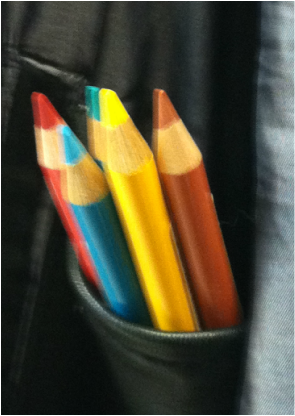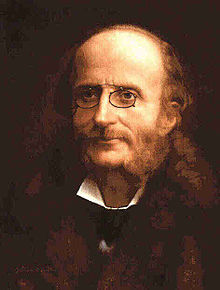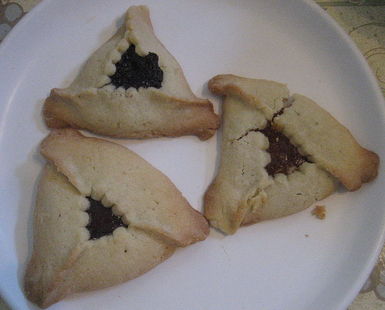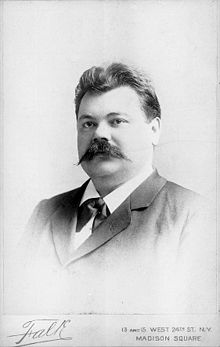I should add that some previous readers hated the story's ending, while others loved it. If you feel so moved, let me know which camp, if either, you find yourself in.
And please enjoy.
The Pencils
High up on the hill, almost atop the city, it is an easy target for wind, rain, even snow, when there is snow; yet looks exactly as it must have, if not when first built, then at least six or seven hundred years ago. (It was built eight hundred years ago--almost twenty times longer than he has been alive!--but somehow manages to remain unblemished. In his mind at least, it is indestructible.)
Of course, the cathedral is a building, and he, only a poor human. If someone were to point out to him this essential difference, he would say, "Of course. Listen, I'm not an idiot, I know: the cathedral's a building, I'm a human." But that doesn't make the difference any easier to swallow! (One of the directors once said to him that "the rational world has borders which are all too near its capital." If he understands the idea correctly, to mean that the rational world is truly a very small place, then his attitude about the cathedral is, he thinks, an excellent example.)
However, to be precise, it isn't the cathedral's agelessness, nor its indestructibility, that is so hard for him to swallow. What aggravates him, taunts him even, on a daily basis, is the beauty of the whole place, the beauty which he is forced to gaze at every time he comes outside (and who could stay in the bar all day? That, too, would be impossibly oppressive.)
In the first place, there is the cathedral itself, with its perfect white marble, eight graceful rosettes all around the façade, sober campanile to the left, elegantly-columned porch in front, and on top, the triangular … he doesn't know the architectural term for it … the triangular top adorned with that nearly Byzantine madonna, which, somehow, has never lost a fleck of paint. And then, the piazza spread out before it, so broad, open, even generous, welcoming. And the steps, beginning here where the piazza narrows, where he's standing ... grand in their own way, too, as they climb, dramatically, even higher up the hill. All of it so gloriously, intoxicatingly, obnoxiously gorgeous--and not despite its age, but in fact partly because of it! The hard edges of church and square and steps have been made, if anything, more beautiful with the passage of time. Whereas he, who was once undeniably beautiful, too, is already in decline.
His hair, still long, is now a middle-aged man's long hair, not a young man's long hair. His features, perhaps still striking, are twice as wide as they used to be: now it is not his eyes but his nose that dominates his face.
Somewhere in between lies the bar: twenty years old, neither untouched by age nor unduly battered by it. Backgammon, the most elegant bar in town, the most expensive, the most advantageously placed, in the crook where piazza meets stairs (in this way, too, it is in between.) In summer, Backgammon's tables extend a good way into the piazza, introducing a modern note into the ancient setting.
According to Roberto's estimate--and according to his little joke--half of those who go inside the cathedral to see the freschi, the frescoes, stop at his place on the way back up for rinfreschi, refreshments. (He's Backgammon's bartender.) Even today, when it's still cold, there has been a steady trickle of customers: Germans and Italians, sweating in their warm clothes as they come in to order wine or aperitivi (in the case of the Italians) or cappuccino (in the case of the Germans, who don't know, or don't care, that it's too late in the day for it.)
Today he's been guessing which ones would stop in, and what they would order. (He's usually right.) He's dressed as always, regardless of the weather, in a dark blue blazer, of vaguely nautical cut, adorned with brass buttons. A little cool for today, a little warm for full summer. (The pencils are stuffed into the blazer's breast pocket.) He considers it more important to look the part than to be comfortable, even if he can’t always rouse himself from his more and more frequent feeling of being tired of the world, which he knows must make some impact on his appearance. He will still be gracious, he will still play captain of the ship. Even now, as a new party approaches from below, he smiles, as much as he can manage, before striding back in ahead of them.
Inside, the place looks good: the furniture is a little scratched, but the mirror behind the counter spotless and streakless, and the backgammon-board motif freshly repainted on the walls. Probably, he's still the envy of all the other bartenders in town. He has even been able to buy Backgammon, after all these years.
It was the director--the director--who gave the place its name. After he founded the film festival (who could have imagined then that the festival wouldn't run forever, that the director would one day die?) and established it in town, and bought up property, including here alongside the piazza, he opened Backgammon (a simple reason: it was his favorite game) and installed Roberto as its bartender.
At the time, Roberto was merely one of a collection of beautiful young men the director liked to keep around him, all hoping to become movie stars. Tending bar there was to be a summer thing.
He bought his first blazer (now there are more than twenty in his wardrobe, all nearly identical, each worn for exactly one year) made caffè and cappuccino and cocktails, hobnobbing late into the night, every night, with the several famous directors who came in after showings, and with the actors (the "other actors," as he thought of them then) and actresses (a few of whom he'd slept with--and especially one of them) and waited for his moment.
They are a party of five: Italian, well-off, chic … two men, three women, relationships not immediately obvious. One of the women reminds him of someone.
The men sit, the women drape expensive purses over chairs before sitting too. Dark glasses come off, gloves too, two of the women remove scarves from their heads, and--actually, the resemblance is really striking! Of course, she can't be Silvia. But she has the same almond, almost Eastern eyes, the same pointed nose, smudge of mouth, dirty blonde hair in a curly bob. She's wearing a light-colored cashmere sweater, tan slacks. When he takes their order, he can barely meet her eye.
Whereas, a few minutes later, standing behind the bar, he can't take his eyes off her. Frankly, she's beautiful. And elegant. But also--bored with her companions? Every time the man next to her--her husband?--touches her arm, she makes a point of straightening her sleeve. She barely opens her mouth, looks toward the doorway, at the ceiling. They've been there twenty minutes when she stands, and approaches the bar.
Like everyone else, she looks first at the pencils, before raising her eyes to his face. Then, she surprises him: "Can I borrow one?" A pencil, she means. And he thinks: Really?
It wasn't long after he'd started tending bar. He had three colored pencils in his pocket. Why? Who knows. Maybe there was a reason. Maybe he was actually planning to write something, the way people did with pencils, back then. In short, there they were: red, yellow, green, tips up.
The bar had a mirror--obviously. He caught sight of himself, and--frankly--he was impressed. Not with the pencils, precisely. With their effect. That is, he looked impressive. The pencils looked like some kind of military--or, why not, naval--insignia. They were sharp, and even. They resembled teeth, it occurred to him, of a shark, for example. Of something dangerous and impressive.
He didn't want to dull them. He wouldn't use them. He'd simply leave them in his pocket (and when it was time for a new blazer? He transferred them.) Until, at some point, they almost weren't pencils anymore. Now, they were stripes, fangs, fetishes.
Or, they were a calendar. Because before long, three pencils became five. Five became eight, eight twelve. And now, with twenty years gone by, twenty.
Naturally, whenever people order a drink, they eye them. And yet, for some reason, perhaps the brooding air beneath his smile, no-one mentions them, no-one asks about them--let alone asks to borrow them. Until now: "Can I borrow one?" And this, from her?
"Of course," he says. "What color?"
She holds the pencil--she's chosen a red one--in her left hand (she wears a wedding ring, too, whether he's her husband or not.) Her fingers are those of a woman entering, or almost entering, middle age, skin drier than it once was, one who uses creams to make her skin look good, not young, exactly, but good. (The same goes, perhaps, for her face.) She's using a sketchpad she carries in her purse: good, thick paper. The sketch takes only a few minutes.
As she finishes, the man--he must be her husband--comes over, glances at the sketch, then at him. "Brava," he says to her (saccharine, patronizing) and then, to Roberto, "If you’re done modeling, how about another round?" (patronizing, but definitely not saccharine.) She returns to the table with him. That's all.
But when they leave? She stays. "Go without me," she says, "I'll catch up, I want to do one more."
And suddenly they're alone in the place, separated only by the bar. She's drawing him again, another study in red, this one a profile. She leans close, examining his features, she's centimeters away, she's even breathing on his cheek.
Quite an intimate feeling, he decides, posing as a model.
Then--she's done. She's closing the sketchpad, wrapping her scarf around her head. Saying goodbye, thanks. And here, for you, the sketches.
"But I’ll keep this," she smiles, dropping the pencil into her purse. "Goodbye."
And he's left alone in the bar.
The morning is slow. It's Monday, no-one really works here on the piazza anyway. Mostly, the place is empty. Until, at eleven, she walks in.
They're all off on a drive, she explains. They wanted to visit those famous vineyards, in that famous town, nearby? Whereas she wants to draw, here. So many interesting subjects, really, cathedral, piazza ... him … if it’s all right. "Only, I forgot to bring any pencils."
But--of course it's all right. Take your pick of colors, he says. (She chooses cobalt, silver, emerald, peach.) He even brings a table and chair outside--it’s warmer today. She’s comfortable? Yes? Then, I'll be inside.
But he can see her through the doorway: a shimmering pink presence in the sunlight. He raises his eyes to one of the framed posters, high up on the wall, posters from the festival. Yes, he nods: the same pink Silvia always wore.
Later, he goes to check on her progress. He bends next to her--she asks for more colors--looks at the four drawings she's made, all of the cathedral. She's an excellent draftsman, everything's there: campanile, rosettes, madonna. Only, somehow the cathedral itself doesn't look excellent. It looks--even if only slightly--misshapen. Off-color. In the subtlest of ways, ugly.
He feels strange, has to sit. He's blocking her view. She looks up. And he asks: "Are you doing this for me?"
"They went off to look for somewhere to buy truffles," she explains this time. "Real tourists." Whereas she wants to draw again--inside, if possible.
"Why not?" he says. (And actually, he’s happy about it.)
She borrows four pencils for starters--leaving him less than ten. She goes to work, drawing the doorway, him, two old customers, a collection of grappa bottles, one particular grappa bottle. He adds up a few figures. When he looks again, she's eying the posters.
She calls out: "That's that actress, isn't it?"
"Which?" He comes over, apprehensive.
"The one who died in the car crash--begins with an 'S'?"
"But," he stares at her, "people must tell you all the time, no? That you--"
"I'm going to draw her."
"--look like--"
"There's something compelling about her face, I think."
He's silent, baffled.
"I need crimson. And pink, of course."
At loose ends, he polishes glasses, straightens out chairs, returns grappa to the shelf, coming near only to lend her more colors, then returning to his work. Finally, she calls him over, to sit next to her: "Look."
It's a drawing of the Silvia poster. Only, there’s no Silvia in the poster--or barely. Only her hand, grasping a letter 'L,' as her head and her torso dangle out of the frame, and her feet descend the bar wall.
"She's escaping, into your bar. Do you like it?"
Does he? He doesn't know.
"And now I want to draw the backgammon pattern. I'll need chocolate brown, and cream--oh, and yellow." He's still fixed on the drawing, as she takes the pencils from his pocket, begins a new sketch.
But, the escaping Silvia? What is that?
Meanwhile, she's still drawing. He looks up, looks at her face, notices for the first time a little scar next to her eye. Silvia never had one ... Suddenly he grabs her arm. "Are you her?"
"Her?" she pulls away. "Who?"
"Silvia."
"What a question!" She laughs, unkindly. "I'm me."
Again, he grasps her, this time by both shoulders. He needs to look into her eyes.
"Let me go," she cries, wrenching herself from his grasp, standing, knocking over her chair, running. He picks up the chair, goes after her. But she's already gone--leaving behind the last of the sketches: Triangles on the wall. And on one of them, a doorknob.
One of the triangles has gotten smudged. He wants to make sure the fresh paint job isn't ruined. But she calls him over, wants one more pencil.
He pretends not to hear. He doesn't want to give it to her. It's his last one.
"Please," she begs.
"But can't you see," he says--and this is where the dream gets strange--"that that would be, in effect, a castration?"
She laughs: "Are you really so conventional that you think a pencil is like a--"
Then, instead of finishing the question, she surprises him. "Please," she repeats, simply and sincerely. Which is when he wakes up.
He opens his eyes. The room is bright. Its harsh light helps to drive away the dream. He squints at the clock, slowly stands. It's time to go home.
Someone knocks on the half-closed shutter outside the door. He hurries over. Someone calls out. He raises the shutter. It's her. She's here, coming toward him, out of the night, she looks like the queen of the night--not the one in the movie, but a real queen, and of this actual night. Beautiful, powerful, serious, intent.
She's taking his hand (her own is warm) leading him gracefully (she wears a dress the color of turquoise) behind the bar (he feels as if they are in a ballet) taking, not asking permission this time, a pencil, the last one--it really is--tracing one of the tall triangles on the wall, a thick line, up one side and down the other, along the bottom, done.
And now she casts aside the pencil--it disappears, beneath a table, into a dark corner, it's gone--is placing her hand against the wall, pushing, pushing, till it gives way, till the triangle opens inward, making a doorway, to--well, to where?
To a place only she knows how to find.
He turns the blazer upside down, shakes it, reaches in the pocket, looks around, on the floor, all about. And sees her.
Her. Here, in his bed. Covered by nothing, a thin, little sheet. His sheet. His bed. And he remembers …
He remembers.
He walks closer, quietly, watching her sleep. He doesn't want to wake her yet. He'll make a coffee on the stove, bring it to her. She'll like that. He turns toward the kitchen--then hears her move, and stops.
"Good morning, my little love." His voice sounds strange to him, like a melody. "Are you awake?"
"I'm awake," she says, the words coming out like little yawns. Then she sits up, the sheet falling away. "And what shall we draw today?"




 RSS Feed
RSS Feed